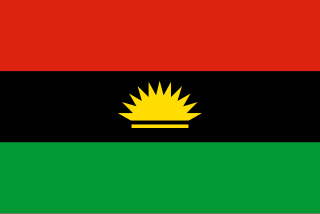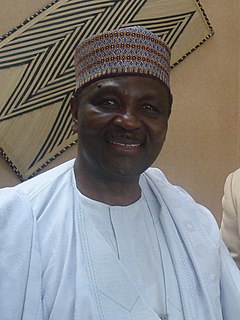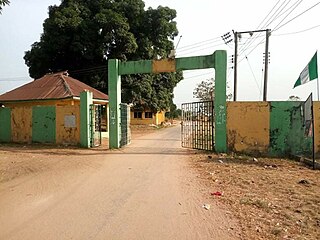Related Research Articles

Biafra, officially the Republic of Biafra, was a partially recognised secessionist state in West Africa that declared independence from Nigeria and existed from 1967 until 1970. Its territory consisted of the predominantly Igbo-populated Eastern Region of Nigeria. Biafra was established on 30 May 1967 by Igbo military officer C. Odumegwu Ojukwu under his leadership, following a series of ethnic tensions and military coups after Nigerian independence in 1960 that culminated in the 1966 massacres of Igbo people and other southeastern ethnic groups living in northern Nigeria. The military of Nigeria proceeded to invade Biafra shortly after its secession, resulting in the start of the Nigerian Civil War.

Yakubu 'Jack' Gowon is a retired Nigerian Army general and military leader. As Head of State of Nigeria, Gowon presided over a controversial Nigerian Civil War and delivered the famous "no victor, no vanquished" speech at the war's end in an effort to promote healing and reconciliation. The Nigerian Civil War is listed as one of the deadliest in modern history, with some accusing Gowon of crimes against humanity and genocide. Gowon maintains that he committed no wrongdoing during the war and that his leadership saved the country.

Enugu is the capital of Enugu State in Nigeria. It is located in southeastern Nigeria. The city had a population of 722,664 according to the 2006 Nigerian census. The name Enugu is derived from the two Igbo words Énú Ụ́gwụ́, meaning "hill top", denoting the city's hilly geography.

The Nigerian Civil War was a civil war fought between the government of Nigeria and the Republic of Biafra, a secessionist state which had declared its independence from Nigeria in 1967. Nigeria was led by General Yakubu Gowon, while Biafra was led by Lt. Colonel Odumegwu Ojukwu. Biafra represented the nationalist aspirations of the Igbo ethnic group, whose leadership felt they could no longer coexist with the federal government dominated by the interests of the Muslim Hausa-Fulanis of northern Nigeria. The conflict resulted from political, economic, ethnic, cultural and religious tensions which preceded Britain's formal decolonization of Nigeria from 1960 to 1963. Immediate causes of the war in 1966 included ethno-religious violence and anti-Igbo pogroms in Northern Nigeria, a military coup, a counter-coup and persecution of Igbo living in Northern Nigeria. Control over the lucrative oil production in the Niger Delta also played a vital strategic role.

Adamawa State is a state in the North-East geopolitical zone of Nigeria, bordered by Borno to the northwest, Gombe to the west, and Taraba to the southwest while its eastern border forms part of the national border with Cameroon. It takes its name from the historic emirate of Adamawa, with the emirate's old capital of Yola serving as the capital city of Adamawa State. The state—one of the most heterogeneous in Nigeria with over 100 indigenous ethnic groups—was formed in 1991 when the former Gongola State was broken up into Adamawa and Taraba states.

Cross River State is a state in the South South geopolitical zone of Nigeria. Named for the Cross River, the state was formed from the eastern part of the Eastern Region on 27 May 1967. Its capital is Calabar, it borders to the north by Benue State, to the west by Ebonyi State and Abia State, and to the southwest by Akwa Ibom State while its eastern border forms part of the national border with Cameroon. Originally known as the South-Eastern State before being renamed in 1976, Cross River State formerly included the area that is now Akwa Ibom State, which became a distinct state in 1987.

Aba is a city in the southeast of Nigeria and the commercial center of Abia State. Upon the creation of Abia state in 1991, Aba was divided into two local government areas namely; Aba South and Aba North. Aba south is the main city centre and the heartbeat of Abia State, south-east Nigeria. It is located on the Aba River. Aba is made up of many villages such as; Aba-Ukwu, Eziukwu-Aba, Obuda-Aba, Umuokpoji-Aba and other villages from Ohazu merged due to administrative convenience. Aba was established by the Ngwa clan of Igbo People of Nigeria as a market town and then later a military post was placed there by the British colonial administration in 1901. It lies along the west bank of the Aba River, and is at the intersection of roads leading to Port Harcourt, Owerri, Umuahia, Ikot Ekpene, and Ikot-Abasi. The city became a collecting point for agricultural products following the British made railway running through it to Port Harcourt. Aba is a major urban settlement and commercial centre in a region that is surrounded by small villages and towns. The indigenous people of Aba are the Ngwa. Aba is well known for its craftsmen and also the most populous city in the South Eastern Nigeria. As of 2016, Aba had an estimated population of 2,534,265. The state's slogan is "God's own State".

The Niger Delta is the delta of the Niger River sitting directly on the Gulf of Guinea on the Atlantic Ocean in Nigeria. It is typically considered to be located within nine coastal southern Nigerian states, which include: all six states from the South South geopolitical zone, one state (Ondo) from South West geopolitical zone and two states from South East geopolitical zone.

Rivers State, also known as Rivers, is a state in the Niger Delta region of southern Nigeria. Formed in 1967, when it was split from the former Eastern Region, Rivers State borders include: Imo to the north, Abia and Akwa Ibom to the east, and Bayelsa and Delta to the west. The state capital, Port Harcourt, is a metropolis that is considered to be the commercial center of the Nigerian oil industry.

Bauchi State is a state in the North-East geopolitical zone of Nigeria, bordered by Kano and Jigawa to the north, Taraba and Plateau to the south, Gombe and Yobe to the east, and Kaduna to the west. It takes its name from the historic town of Bauchi, which also serves as its capital city. The state was formed in 1976 when the former North-Eastern State was broken up. It originally included the area that is now Gombe State, which became a distinct state in 1996.

Northern Nigeria was an autonomous division within Nigeria, distinctly different from the southern part of the country, with independent customs, foreign relations and security structures. In 1962 it acquired the territory of the British Northern Cameroons, which voted to become a province within Northern Nigeria.

The Eastern Region was an administrative region in Nigeria, dating back originally from the division of the colony Southern Nigeria in 1954. Its first capital was Calabar. The capital was later moved to Enugu and the second capital was Umuahia. The region was officially divided in 1967 into three new states, the East-Central State, Rivers State and South-Eastern State. East-Central State had its capital at Enugu, which is now part of Enugu State.

Oguta is a town on the east bank of Oguta Lake in Imo State of southeastern Nigeria.
The Agbekoya Parapo Revolt of 1968–1969, popularly known as Agbekoya or the Egbe Agbekoya Revolt, was a peasant revolt in Nigeria's former Western region, home to the majority of the country's Yoruba population.This war was fought and won against the Federal government of Nigeria by the Ibadan people of present Oyo State, on behalf of all Yoruba Land. It was spearheaded by two villages in Ibadan: the AKaran and the Akufo village. It is the most well known peasant-driven political revolt in western Nigerian history, and continues to be referenced by grassroots organizations as a successful example of collective action against unpopular government policies. The revolt was predominantly aimed at agitating for a reduction in taxes, though some believed there were also political catalysts.

The First Republic was the republican government of Nigeria between 1963 and 1966 governed by the first republican constitution. The country's government was based on a federal form of the Westminster system. The period between October 1, 1960, when the country gained its independence and January 15, 1966, when the first military coup d’état took place, is also generally referred to as the First Republic. The first Republic of Nigeria was ruled by different leaders representing their regions as premiers in a federation during this period. Leaders include Ahmadu Bello Northern Nigeria 1959 – 1966, Obafemi Awolowo Western Nigeria 1959 – 1960, Samuel Akintola Western Nigeria 1960 – 1966, Michael Okpara Eastern Nigeria 1960 – 1966, and Dennis Osadebay Mid-Western Nigeria 1964 – 1966.
Eket is one of the 31 local government areas in Akwa Ibom State, Nigeria. The name Eket or Ekid also refers to the indigenous ethnic group of the region and to their language. The Eket people use the endonym Ekid for themselves and their language, but Europeans spell and pronounce the name as "Eket".
The 1966 anti-Igbo pogrom was a series of massacres committed against Igbo people and other people of southern Nigerian origin living in northern Nigeria starting in May 1966 and reaching a peak after 29 September 1966. Between 8,000 and 30,000 Igbos and easterners have been estimated to have been killed. A further 1 million Igbos fled the Northern Region into the East. In response to the killings some northerners were massacred in Port Harcourt and other eastern cities. These events led to the secession of the eastern Nigerian region and the declaration of the Republic of Biafra, which ultimately led to the Nigeria-Biafra war.
Uruan is located in the south of Nigeria and is a Local Government Area of the Akwa Ibom State.
Eman Ukpa is a village in Uruan local government area of Akwa Ibom State, Nigeria inhabited by the Ibibio people.
Eman Ikot Ebo is a village in Uruan local government area of Akwa Ibom State, Nigeria. The Ibibio people are occupants of the Eman Ukpa village.
References
- ↑ (Nigeria), Eastern Region (1959). Laws, Eastern Region of Nigeria: Containing the Ordinances of Eastern Region of Nigeria and Subsidiary Legislation Made Thereunder. Government Printer.
- ↑ Nigeria, the Military & Political Leadership: A Compendium on the Socio-economic & Development Dynamics. Polcom Press. 1995.